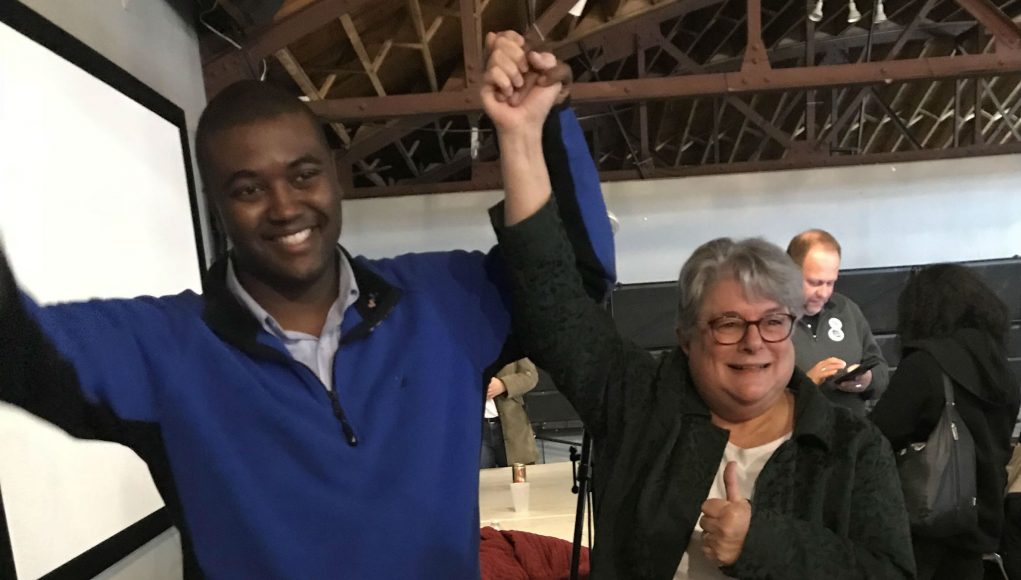Chris Walton doesn’t mind being the only black face in a room. As long as it doesn’t stay that way.
“I don’t mind being the only black face in the room. I mind remaining the only black face in the room,” says Walton, 29, the newly-elected Chair of the Milwaukee County Democratic Party. “If I’m the only black face in the room, that’s okay. But if I’m the only one there, and that’s it, that’s a problem. So I feel like I can use this position to open doors for people who may not necessarily get involved in politics. I see this as a route.”
Walton is the first black man to chair the County party since the 1980s, which, Walton says, gives him a unique opportunity to represent.
“Especially with Milwaukee and Racine being considered some of the areas in the country that are the worst for the black community in America, having somebody who is from Milwaukee and can speak from Milwaukee and on Milwaukee issues, and being an African-American, and having him in a position where they actually speak to power on behalf of that community, it’s big,” Walton says.
And it’s important for Democrats to reach black voters, Walton says.
“A lot of people speak about how we need to work on bringing working-class Trump supporters back into the Democratic Party fold,” he says. “Well, we also have working class black voters who are still in the Democratic Party fold. We have to pay attention to them as well. They need jobs as well.”
Walton is a pioneer in another way — the first openly LGBT person to lead the Milwaukee County Dems.
“I’m the G,” he jokes. It’s important for LGBT people to take political leadership positions, he says, “considering a lot of the issues that are currently going on, especially coming from the Trump Administration, trying to push the transgender community out of the military, or cutting healthcare funding, which of that funding goes for HIV meds and prep outreach, just trying to cut wherever they can to push the LGBT community into the corners and into the dark.”
Besides his intersecting identities, Walton brings organizing experience going all the way back to his teen years, when he volunteered on Matt Flynn’s 2004 campaign for Congress as a teenager. He went on to work on both of Barack Obama’s campaigns for president and earn a degree in political science from Mississippi State University. He’s worked in nine states “on numerous campaigns, from City Council, all the way to President,” Walton says.
Since returning to his native Milwaukee in 2015, Walton has worked as Southeast Regional Director for the Democratic Party of Wisconsin and then Political Director of the Milwaukee County Party until being elected Chair last week.
Walton takes the Chair going into a crucial year for Democrats nationwide, as the national party aims to take the House of Representatives — or at least eat into the Republican majority there — in what Democrats hope to be a rebuke to Donald Trump, a historically unpopular president.
2018 will be a high-stakes year for Democrats in Wisconsin as well, as the party has lost three straight gubernatorial races to Scott Walker.
Walton likes the party’s chances, though, in large part because of a growing field of strong candidates for governor.
“I think they’re ready,” he says of the several announced candidates for governor. “They’re building up their teams, they’re really getting their names out there, and they’re building bases. We have the state superintendent (of Public Instruction) Tony Evers. We have people like Senator (Kathleen) Vinehout, and Dana Wachs out of the Eau Claire, northwestern area. Andy Gronik and Matt Flynn here in Milwaukee, and Mahlon Mitchell out of Madison, as well. If he were to get nominated, he’d be the first African-American to be running for Governor of Wisconsin. If any one of them gets the nomination, I believe that they stand a fairly good chance of winning. Walker hasn’t gotten above 53 percent the entire time he’s been running. So, if a wave comes, we can easily overtop 53.”
One of Walton’s priorities will be working to helping people vote, despite new voter ID laws.
“I think voter registration and voter ID. Those are the two biggest things,” he says. “Two hundred thousand people in the state of Wisconsin weren’t able to cast their vote last year pretty much because of voter ID issues. That 200,000 people, not saying that Secretary Clinton would’ve gotten all 200,000 of them, but that 200,000 definitely could’ve flipped the state.”
Flipped it to the wrong color, in Walton’s mind.
“This is the first time in my lifetime that I’ve seen Wisconsin red,” he says. “Even though red is my favorite color, I don’t want to see my state red.”
Beyond getting people registered and ready to vote, Walton wants to make sure people are motivated to get out to the polls — and that comes from outreach.
“For me, this is a goal, to … represent the party to communities that don’t normally get a lot of outreach, and don’t normally hear from people who are the big wigs,” he says. “I want to be that listening post for the people who don’t normally get people they can reach out to. But at the same time, I also want to be able to speak to the people who are fellow big wigs. Like, ‘Hey, this community needs this because these are the issues they are facing.’ The black community on the north side of Milwaukee faces a lot of issues. The Hispanic community on the south side of Milwaukee faces a lot of these issues. How can we actually fight back against those issues to make sure that they are motivated to come out at every single election, be it the governor, be it a mayor, be it the President in ’20.”




























